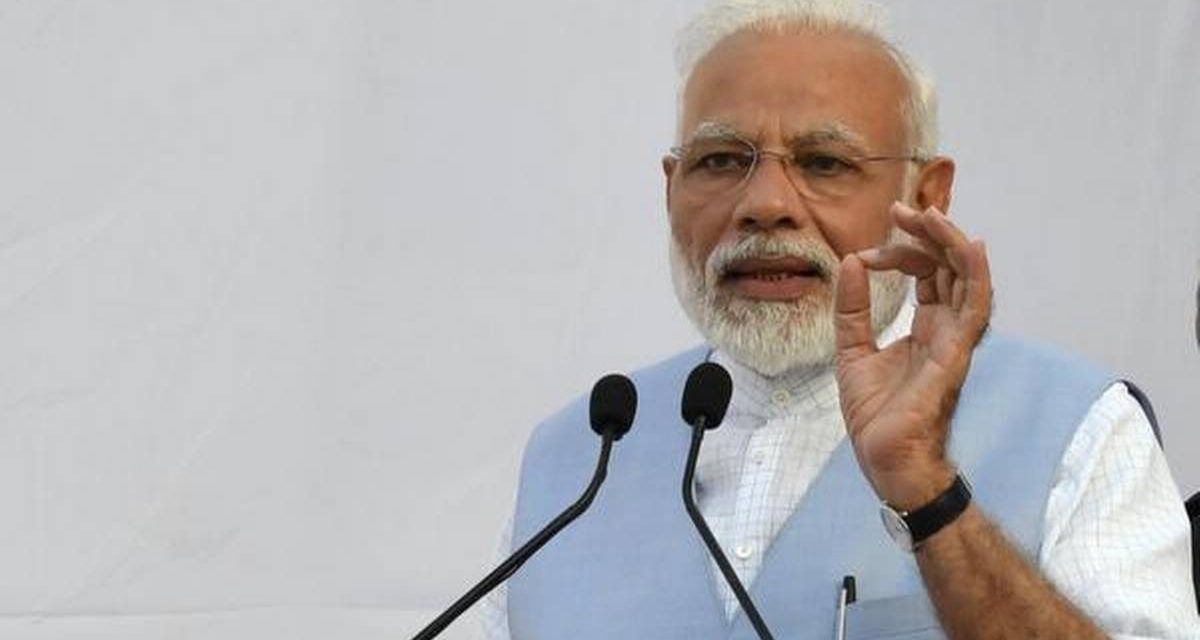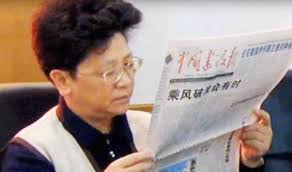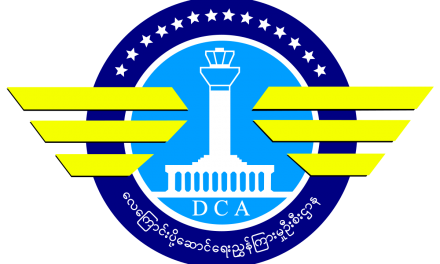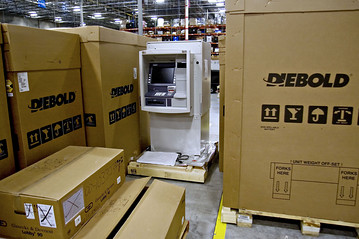30 August 019
China and India have traditionally been corrupt countries for decades. With new leaders in power, both countries set out to eradicate corruption, with only a limited success. Still corruption is rampant in both countries. In the Transparency International’s Corruption Perception Index, India ranked 78 in 2018 with a score of 41/100. In the previous year it was ranked 81. It climbed up 3 notches in the past year in the right direction. India’s score in 2015 was 38. It has climbed up 3 notches in the past four years in the right direction. Transparency International singled India out, along with the Maldives and the Philippines, as one of the region’s worst offenders in corruption.
It is not that PM Modi (in picture) and his government have not done enough to eradicate corruption. But there are lingering doubts as to whether the anti-corruption measures are implemented impartially. People also think that BJP is allowing corrupt members of opposition parties to join BJP and give them protection from legal action.
BJP and its top leaders have been claiming that the Modi government has been a corruption-free administration. Sukh Ram Sharma, once a stalwart of Congress in Himachal Pradesh and Mukul Roy, the second most powerful politician in Tinamool Congress in West Bengal, both deserted their parties and joined the BJP. Both are accused of serious corruption charges and these two defections do not corroborate BJP claim. It seems that Modi government is willing to shake hands with the corrupt to gain political grounds. BJP desperately wanted to take Himachal Pradesh from Congress and West Bengal from Tinamool Congress.
On the other hand, both the CBI and the ED were extremely assi duous in using a two-day window afforded by the Supreme Court’s listing to scale the wall of
P. Chidambaram’s house to enter the premises to arrest him. Because he is an opposition leader. They are also questioning Chidambaram’s son Karti and
Robert Vadra, the brother-in-law of Congress leader Rahul Gandhi. This clearly shows that BJP is partial in dealing with corruption within its own ranks and in opposition parties.
Demonetisation.
Demonetisation was touted to be the most important step taken by Modi government to fight corruption. The poorly planned demonetisation in 2016 turned out to be a failure as the government did not bring back promised amount of black money stacked away abroad to be given as a surprise gift to the poor. Modi’s advisors failed to make a realistic estimate of black money that was parked outside India.
According the minutes of the RBI meeting held to approve Modi’s demonetisation, then RBI Governor Urjit Patel and the Board of RBI did not agree with the government’s reasoning for demonetisation and also did not believe that it would achieve the stated objectives. But they still commended the move of the government.
All the black money that went out of India was invested abroad or made its round-trip back to India laundered clean and was invested in tangible assets in India. Why would a businessman keep any money overseas earning one-half per cent interest per annum while he could earn 5 to 8 per cent interest within India? That is why they were quick to bring back the laundered money.
The seasoned dealers in black money managed to create a new black market to service people wishing to offload more than Rs 250,000 by breaking them down into smaller blocks and depositing them in the accounts of tens of thousands of illegal couriers.
These made demonetisation a futile attempt in flushing out black money.
Banking sector.
Last year Central Bureau of Investigation (CBI) accused one of India’s most prominent and celebrated billionaires, Nirav Modi (not related to PM Modi) of masterminding a $1.8 billion fraud against one of the country’s biggest state-run banks. A few days before the misconduct was uncovered, Modi left the country with his entire family. The authorities have confiscated the assets owned by
Nirav Modi in India and are demolishing a plush sea-facing bungalow.
In another case, disgraced former chairman of India’s United Breweries Group,
Vijay Mallya whose spirits company manufactures Kingfisher beer, fled India in March 2016 after defaulting on loans worth more than $1.4 billion. A British court has ordered the extradition of Vijay Mallya to face fraud charges in India.
Critics ask how the government could have allowed two such high-profile figures to leave the country. These two scandals show the weakness in the primary anti-corruption mechanisms which lack genuine enforcement authority and deterrence power.
PM Modi also wants to hold errant tycoons to account. The Fugitive Economic Offenders Act (FEOA) was enacted and it came into force in Aril 2018. Under this act, if an economic offender flees the country to avoid due process, he/she can be declared a ‘fugitive economic offender’ and their properties can be confiscated. Nirav Modi and Vijay Mallya have been declared as economic offenders.
Modi has given the quasi-independent Reserve Bank of India power to push big defaulting companies into bankruptcy, including the Ruia family’s Essar Steel, and to oust the chief executives of underperforming banks.
The government inherited a banking system burdened with huge bad debt. The non-performing assets came about as a result of bad credit decisions, poor monitoring, collusion of bank employees, as well as cyclical business downturn. By early 2016, the Banks Board Bureau (BBB) was set up to recommend banking reforms. But the recommendations of BBB were not implemented, and the reforms lost steam. As a stop gap measure the government infused $30 billion capital into the banking sector. But in the absence of reforms, it is only good money being thrown after bad.
Lokpal Bill
Anna Hazare started an anti-corruption which resulted in the fall of then corrupt Congress government and paved the way for Modi to gain power.
Anna Hazare wanted a
Lokpal Bill and the institution of an ombudsman with the power to deal with corruption in public places.
The Modi government has been dragging its feet on the enactment of the Lokpal Bill, which calls for the creation of state and federal anti-corruption agencies with real investigative and prosecutorial powers.
Rafale Defence Scam
Modi was personally involved in the negotiation of the
Rafale fighter jet deal. This deal made it possible for Anil Ambani’s newly minted defence company to get a huge defence contract at the cost of PSU Hindustan Aeronautics Limited (HAL) though it has zero experience in the defence sector! Former French President Francois Hollande told French news organisation Mediapart that it was the Indian Government which proposed that Reliance replace HAL. Hollande’s revelation directly contradicts the Modi Government’s claim that it had no choice in deciding Dassault’s offset partners. Rafale deal has so far failed to enrage the public.
The accusations that Modi government has unfairly supported tycoons like Mukesh Ambani have fallen flat with consumers who benefit from super-cheap data through upstart mobile operator Jio, part of his flagship Reliance Industries. Ambanis lavishly contributed to Modi’s election war chest.
While CBI is assiduously investigating corruption involving opposition party members, it takes no notice of the corruptions perpetrated by the BJP leaders.
Here are some cases of politicians, allies of BJP, who were not investigated for corruption up to now.
B.S. Yediyurappa
He is now Karnataka’s chief minister. He was accused in land and mining scams. Diaries recovered from him showed hefty amounts being paid to top BJP leaders, judges and advocates. He formed the Karnataka Janata Paksha but in 2014 this party merged with BJP. Yediyurappa was acquitted of most of the charges. The CBI that was investigating him for years couldn’t furnish enough evidence against him after the Modi government came to power.
Yediyurappa allotted prime residential and industrial land on preferential basis to his family members and supporters. He gave away two acres of industrial land to his family firm in Bangalore, two acres to his daughter’s BPO firm, a residential plot to his son in Bangalore, 134 acres (mining lease) to his followers and residential plots to his relatives in Mysore.
Reddy brothers of Bellary
Before the Karnataka elections in 2018, the CBI closed all its investigations into mining scams worth Rs 16,500 crore against the Bellary Reddy brothers.
Himanta Biswa Sarma
Biswa Sarma was once a member of the Congress party and faced corruption charges. The BJP had waged a full campaign, even releasing a booklet, accusing Sarma of being the “key suspect” in the water supply scam in Guwahati. The scam is known as the Louis Berger case because of the involvement of the American construction management company which was charged by the US Department of Justice under the country’s Foreign Corrupt Practices Act, alleging that the company paid bribes to an unnamed minister. Sarma joined BJP and the Assam government has predictably gone slow on the investigations, and the BJP hasn’t followed up with its own old demand to hand over the case to the CBI.
Mukul Roy
Mukul Roy (briefly mentioned above) was formerly number two of Mamata Banerjee, West Bengal Chief Minister. He had a fall out with Mamata in 2015 when his name came up in Saradha scam as well as in Narada sting operation. He was suspended from the party for six years. He then resigned from Tinamool Congress in September 2017. Later in November, he joined the BJP.
Sukh Ram Sharma
Sukh Ram (briefly mentioned above), once considered to be a stalwart of Congress party in Himachal Pradesh, has been convicted in a telecom scam in the mid-90s. Sukh Ram was telecom minister and was found indulging in corrupt practices by the CBI. And in fact, when his house was raided later a lot of hard currency was recovered from the bedroom and bathroom. He later joined BJP.
Pema Khandu
Pema Khandu along with 32 MLAs of Peoples’ Party of Arunachal (PPA) joined the BJP leading to the formation of a full-fledged BJP government in December 2016. PPA secretary-general Kaling Jerang accused Khandu with allegations of corruption based on a suicide note left behind by late Kalikho Pul.
Anil Sharma
He served as cabinet minister in the previous congress government. He joined the BJP as he was facing a probe for alleged involvement in telecom scam.
Corruption in BJP carder
These BJP politicians have been accused of corruption but no action has been taken against them until now. This shows the partiality of the BJP government in dealing with its own rank and with the members of opposition parties.
Ramesh Pokhriyal ‘Nishank’
As Uttarakhand chief minister, he was at the centre of two big scams: one regarding allocating 15-acre plot of land at below market price and the other concerning 56 hydro-electric projects which were subsequently cancelled.
Narayan Rane
Former Maharashtra chief minister Narayan Rane has been accused of money laundering and land scams. The CBI and the ED have not investigated his misdeeds. Theprint.in reported.
Sangeet Som
He is BJP’s leading anti-beef crusader. He is a member of the Central Government (MLA). The company, Al-Dua Food Processing Private Ltd, was founded by Mr. Som, along with Moinuddin Qureshi and a third partner, to deal in meat and meat products in 2005. According to Al-Dua’s website, the company is now a “leading producer and exporter of halal meat from India.” It was alleged that meat included beef.
Sanjay Pradhan, BJP MLA from Sardhana Assembly Constituency, alleged that Som took Rs.46 lakhs from him on the promise that he will use his influence to get Pradhan a PWD contract and did not even deliver his promise. In a written complaint to the Meerut Senior Superintendent of Police, Rajesh Kumar Pandey, Pradhan sought action against Som and demanded that he gets his money back.
“I gave Rs.43 lakhs to Thakur Sangeet Som after he assured that he will get me a PWD contract to build a degree college in Dadri area. It was on this promise that I gave Rs.15 lakh to Shekhar, an associate of Mr Som on July 15, last year. Then he asked me to pay Rs.25 lakh to some Robin who owns a hotel. Then I gave Rs.3 lakhs to Som’s brother, Sagar Som,” Pradhan claimed while talking to NewsClick. Dadri has a substantial chunk of Thakur population and Sangeet Som, who has always portrayed himself as an influential Thakur leader, enjoys influence in the local Thakur circle.
Pradhan, who is the head of the Ghat village in Sardhana and is also a member of the BJP’s district executive committee, said that the police did not take any action on his complaint because they were acting under pressure of the ruling party MLA. Just imagine that this is said by a BJP legislator; what can ordinary people do under such circumstances..
This is not the first time that Som is faced with allegations of corruption. A local businessman Rahul Singh alleged that Som duped him of Rs.53 lakhs. “I sold my 50 milch animals and nine bighas ( a measure of land which varies from one region to another) of land to get in partnership with Som for a business proposition last year. He used my money to establish the business but he did not offer me any of the profit. When I asked him for profit, his brother gave me a death threat,” Singh told NewsClick.
“Upon the Village Panchayat’s persuasion, he registered nine bighas of land under Rahul’s name and assured the village panchayat that he will return my money in a year and now after giving his land, he is going back on his words,” Singh added.
Singh has filed a complaint against Som in the ADG Meerut’s office as well. On Wednesday, he also told the media that he would commit suicide outside the Chief Minister Adityanath’s office in Lucknow, if the administration does not act on his complaint.
After all, politics is now a business. In fact, the line between business and politics does not exist anymore. That’s why people like Som are in every party because of their ‘win’ factor. What Som is doing in a crude manner, politicians such Modi, Mulayam, Rahul have been doing in a refined way. People love politicians who provoke sectarian, cast and communal emotions. Media may claim itself to be sacrosanct but majority have no courage to speak the truth. Newsclick reported.
Sashi Prakash Goyal
Yogi Adityanath is an Indian monk and Hindu nationalist politician. He is currently the BJP Chief Minister of Uttar Pradesh (home state of PM Modi). A serious allegation was made against Yogi Adityanath’s Principal Secretary, Sashi Prakash Goyal. He was accused of allegedly demanding a bribe of Rs.25 lakhs to set up a petrol pump in Hardoi. The case turned into a source of major embarrassment after the State Governor Ram Naik wrote to the chief minister Adityanath, informing him about a complaint he had received through an email from a businessman Abhishek Gupta, against Goyal. Gupta claimed that Goyal allegedly asked for widening the narrow road which connects his proposed petrol pump to the main road.
BJP leaders face several allegations of corruption under the Yogi Government in UP. Opposition leaders say, that with the police working on Yogi Government’s instructions, the corrupt politicians are well protected from the arms of the law.
Adityanath government detained Abhishek Gupta and interrogated him. After spending a day in detention, Gupta retracted his allegations and said that he had “lost his mental balance”, prompting a series of criticism from the Opposition leaders about the Yogi government’s decision to go after the complainants in cases of corruption. Newsclick reported.
The CBI on Thursday (29 August 2019) interrogated BJP leader Mukul Roy for two hours in connection with the Narada sting tapes case. The Narada sting tapes, showed people resembling senior TMC leaders receiving money allegedly for promising favours.
Former Tinamool leaders Sovan Chatterjee and Aporupa Poddar who joined the BJP have also been summoned to the CBI’s Kolkata office.
Decan Herald reported.
Post Views: 163















